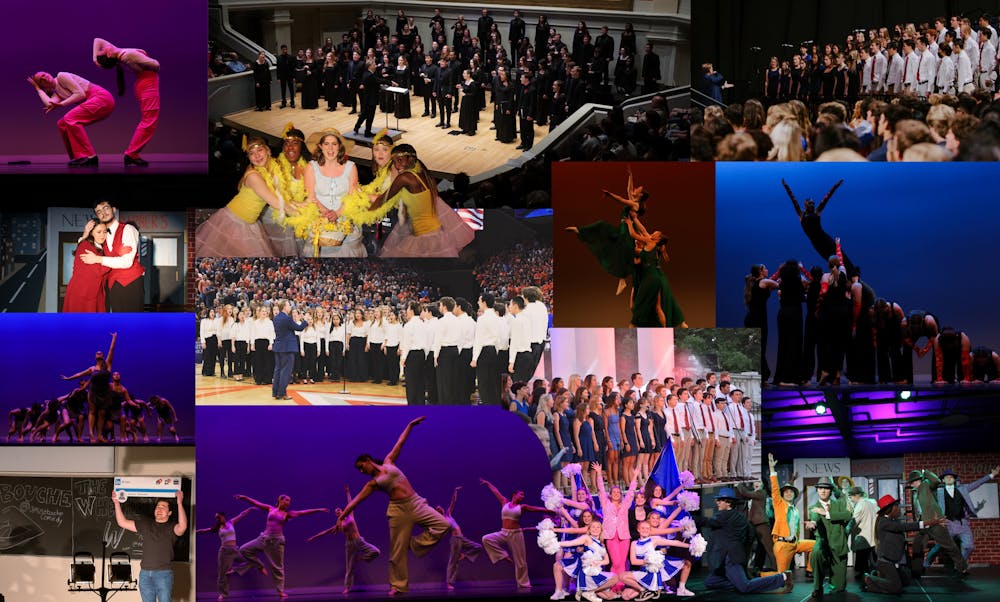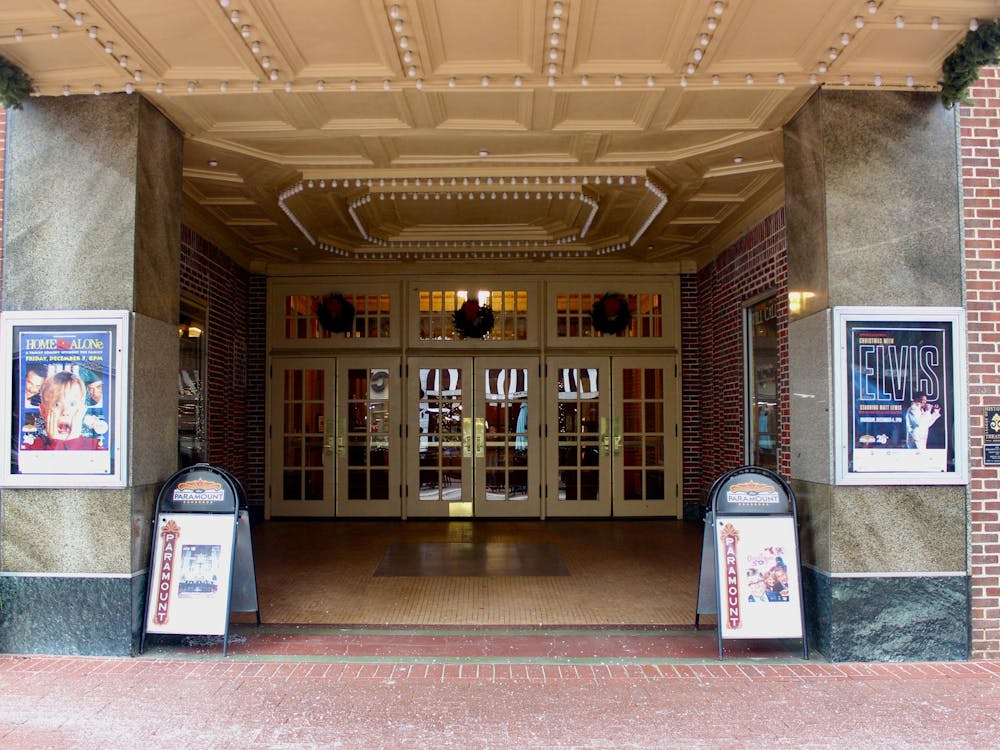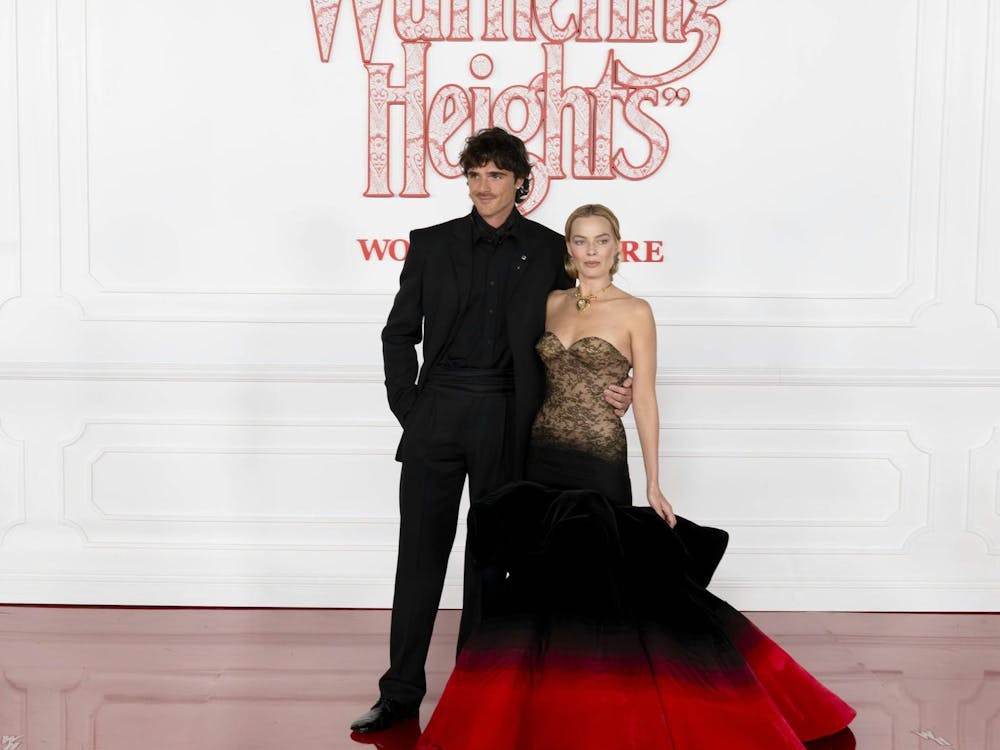As they prepare to walk the Lawn, graduating fourth-year leaders are leaving their mark on student arts organizations. From increased accessibility for student dancers and comedians, to a more inclusive community established in the theater and music scenes, the University’s robust arts community has undergone tremendous change under its class of 2025 leaders.
The Cavalier Daily spoke with four graduating current and former presidents of arts Contracted Independent Organizations, who reflected on their time leading their organizations and shared hopes for the future of the arts at the University. Their contributions reflect a broader momentum towards accessibility and inclusive community within the arts scene on and around Grounds, a momentum which is fueled by student-led passion and collaboration.
For many of these students, stepping into a leadership role was a natural evolution of their commitment to their craft. Fourth-year College students Rachel Bohannon and Caroline Jareb said they knew as early as their first year that they wanted to lead their organizations. Bohannon became President of University Singers during her third year and Jareb served as Producer of First Year Players during her third year spring and fourth year fall.
“I really looked up to the people who were Producer before me, and thought, wow, they're doing so amazing,” Jareb said. “They're helping create this awesome community that I get to be a part of … I wanted to continue that.”
As Producer, Jareb was responsible for overseeing the production of shows on all levels from start to finish and working alongside her fellow upperclassmen executive board members who helped manage the tech team, pit orchestra and cast. In a tradition unique among University student theater groups, FYP only casts students in their first year at the University in its semesterly musical productions. Because of this mission, community building is at the forefront of FYP’s mission.
“The nature of FYP is about community, so I really got to focus on … leading with kindness and creating community, creating art that has meaning to people, creating an outlet for people,” Jareb said.
Bohannon expressed similar sentiments in her leadership style for USingers, the University’s flagship choir under the direction of faculty conductor Michael Slon. Bohannon joined USingers during her first semester at the University, and her love and passion for the group called her to step into a leadership role as early as her second year — first as a social chair, then as General Manager. Now as president, Bohannon manages the entire operations of a 17-member executive board.
“Coming into U.Va., the only thing I wanted was to be in USingers … And as soon as I got into USingers, I knew I wanted to be President,” Bohannon said. “It’s always been so important to me to feel like I have a sense of ownership over the groups that I'm involved in because I want to shape it to be as wonderful for other people as it has been for me.”
Bohannon’s leadership has brought harmony to the choral world, fostering collaboration and creativity in her artistic community with a positive attitude and emotional investment in the art they produce. She speaks highly of the USingers community and the beautiful art they create together, both of which have defined her University experience.
“You have 80 built-in friends, and we get to do something that no other organization at the school, in my opinion, comes close to — which is make music that is magical,” Bohannon said. “I feel a kind of joy and a sense of purpose that nowhere else at this University is able to give me.”
Fourth-year College student Savannah O’Leary and fourth-year Batten student Lilah Sherr brought these same values of community building to their respective organizations — the___incident sketch comedy group and the University Dance Company — during their time as leaders. Though their disciplines differ, both leaders focused their efforts on fostering safe spaces where students of all backgrounds and experience levels felt welcome.
O’Leary took on the role of president of the___incident from the spring of her third year through the fall of her fourth year and designed the comedy group’s practices to be open and inviting, allowing members to pitch ideas, co-write or work independently based on their comfort levels. This approach encouraged vulnerability in an environment where comedy could be experimental and ensured that members felt comfortable taking risks.
“One of my top priorities as president was to make sure that the club felt as warm and welcoming for new members and old members together,” O’Leary said. “Being able to shoulder that kind of responsibility with such a supportive group like the___incident was just a really wonderful introduction to leadership in general.”
That same emphasis on openness and flexibility guided Sherr’s leadership in UDC, which implements a “user-friendly” model where dancers can choose their level of involvement based on their availability. Sherr, who had grown up dancing but chose not to major in it, was drawn to UDC’s approachability and its healthy, affirming atmosphere. Over time, she served as costume chair, vice president and ultimately, president.
“I was excited by an opportunity to do something that still hit all the points that I wanted — getting to dance, getting to choreograph — but not consume my life,” Sherr said.
According to Sherr, rather than auditioning for UDC as a club, members audition for individual dances in a variety of styles including lyrical, contemporary, jazz, tap, hip hop and Irish dance. The club also uniquely auditions for an “open dance” tailored to those with no prior dance background, which provides an opportunity for new dancers to perform in showcases.
“UDC is about inclusivity, and our motto is dance for the love of dance,” Sherr said. “We had some graduating members in our open piece this past month who didn't dance before college and have been able to join the dance community in what we hope is a healthy, welcoming, safe environment.”
Sherr said she wanted to open UDC to as many dancers as the club could accommodate during her tenure, but this did not come without its challenges. According to Sherr, one of the biggest challenges as president was figuring out how to stay true to UDC’s value of inclusivity while also celebrating the growth they have experienced from 60 to 100 members during Sherr’s time in the group.
“When there’s more people, that means we come in conflict with our inclusivity,” Sherr said. “The stage at Old Cabell Hall is not getting any bigger … [but] we’ve made our performances longer to include more pieces so that more people have the chance to choreograph.”
Jareb echoed a similar sentiment about expanding access through theater, emphasizing FYP’s mission to engage new students with relevant, meaningful performance opportunities. She hopes new leadership will continue to promote a welcoming environment within the organization.
“Let's keep bringing people in and being accessible and inclusive to as many people as we can,” Jareb said.
In addition to widening access in the arts moving forward, O’Leary emphasized how impactful leadership can also mean guiding a group through meaningful transformation. Having led the___incident through a rebrand from its original name, Hot Kids Comedy, she encouraged future student arts leaders to lean into change and help their groups evolve.
“[Leading the___incident was] one of the most rewarding things I've done at U.Va,” O’Leary said. “I would tell upcoming leaders to not be afraid to make big changes because that can sometimes be what takes that club or CIO from one level to the next.”
These creators may soon exit the stage, but the inclusive structures they helped shape and the artistic culture they cultivated on Grounds will remain. While saying goodbye to their groups is bittersweet, all four leaders placed their trust in the next generation of artists to carry their organizations forward with the same heart.
“It’s very awesome to see how people pick up the torch,” Jareb said. “There's so many people in this community who want to keep it strong, and there's so many new people who will keep coming every year.”







